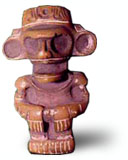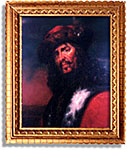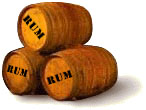History of the Bahamas
Prehistory
 Documented
Bahamian history begins with the words, "Baja Mar," the
name the Spanish bestowed on the islands. This term is misleading,
however; it means "shallow sea," but the islands
are really mountain plateaus that emerged from the Atlantic
hundreds of thousands of years ago. As they grew, they hosted
countless generations of coral, which today comprise the islands'
limestone base.
Documented
Bahamian history begins with the words, "Baja Mar," the
name the Spanish bestowed on the islands. This term is misleading,
however; it means "shallow sea," but the islands
are really mountain plateaus that emerged from the Atlantic
hundreds of thousands of years ago. As they grew, they hosted
countless generations of coral, which today comprise the islands'
limestone base.
The "Lukku-cairi" or
island people, as they called themselves, were the first settlers.
Originally from South America, they meandered up through the
Caribbean and finally arrived in The Bahamas around the Ninth
Century AD. Known as Arawaks, they are also called "Lucayans" and "Indians"-
a label bestowed by Columbus, who mistakenly thought he found
the East Indies when he dropped anchor in San
Salvador in
1492.
Golden
Age of Piracy
The
next phase of Bahamian history involves the Eleutheran Adventurers,
English settlers who left Bermuda in 1647 searching for religious
freedom. They formed the first British colony on the Island
of Eleuthera,
and began a prosperous agricultural economy that still thrives
today.
 The
geography of the islands attracted many well-known
pirates,
such as the infamous Blackbeard, Henry
Morgan,
and Anne
Bonney,
who dominated the islands for the next 70 Years in what was
known as "The Golden Age of Piracy." Their chief
occupation was luring unsuspecting ships into the treacherous,
shallow waters, then pouncing on and plundering them like insects
trapped in a spider's web. Britain, which claimed islands in
1670, remained powerless against their predations for almost
50 years, until the first governor, Woodes Rogers, drove them
out in 1718. Britain then recognized them as a colony.
The
geography of the islands attracted many well-known
pirates,
such as the infamous Blackbeard, Henry
Morgan,
and Anne
Bonney,
who dominated the islands for the next 70 Years in what was
known as "The Golden Age of Piracy." Their chief
occupation was luring unsuspecting ships into the treacherous,
shallow waters, then pouncing on and plundering them like insects
trapped in a spider's web. Britain, which claimed islands in
1670, remained powerless against their predations for almost
50 years, until the first governor, Woodes Rogers, drove them
out in 1718. Britain then recognized them as a colony.
Privateering,
a government-sanctioned form of piracy practiced during Britain's
war with Spain and the American Revolution, brought periods
of prosperity to the islands. Spain entered the fray on the
side of the Americans and briefly retook The Bahamas in May
1782. A year later, under the Treaty of Versailles, it once
again became a British colony.
The Era of Smuggling

 Following
Britain's defeat in the American Revolutionary War, southern
loyalists brought their slaves to the islands and grew cotton
under the Crown's protection. Troubled times in neighboring
America often meant prosperity for The Bahamas. In 1861, during
the American Civil War years, the Union Navy blockaded the
islands in an attempt to cripple the Confederacy, and Bahamians
grew rich running Confederate cotton to English mills and sending
military equipment to Confederate rebels.
Following
Britain's defeat in the American Revolutionary War, southern
loyalists brought their slaves to the islands and grew cotton
under the Crown's protection. Troubled times in neighboring
America often meant prosperity for The Bahamas. In 1861, during
the American Civil War years, the Union Navy blockaded the
islands in an attempt to cripple the Confederacy, and Bahamians
grew rich running Confederate cotton to English mills and sending
military equipment to Confederate rebels.
Tourism
and Independance
 Hard times followed the end
of the Civil War until Prohibition and the "Roaring Twenties" transformed
The Bahamas into a base for rum-running. But after Prohibition
was repealed, the islands again lapsed into economic stagnation.
Prosperity did not return until World War II, when the Bahamas
served as an air and sea way-station in the Atlantic. Shortly
after, the new industry of tourism changed the priorities in
the islands. For the first time, the beauty and life of the islands
were recognized as an asset. When Cuba was closed to US tourists
in the 1950's, The Bahamas forged ahead to become one of the
world's most popular tourist destinations.
Hard times followed the end
of the Civil War until Prohibition and the "Roaring Twenties" transformed
The Bahamas into a base for rum-running. But after Prohibition
was repealed, the islands again lapsed into economic stagnation.
Prosperity did not return until World War II, when the Bahamas
served as an air and sea way-station in the Atlantic. Shortly
after, the new industry of tourism changed the priorities in
the islands. For the first time, the beauty and life of the islands
were recognized as an asset. When Cuba was closed to US tourists
in the 1950's, The Bahamas forged ahead to become one of the
world's most popular tourist destinations.
Great Britain granted the
islands self-government in 1964 and changed their status from
colony to Commonwealth in 1969. In
1973, the Commonwealth of The Bahamas became independent within
the Commonwealth of Nations, but retained Queen Elizabeth II
as constitutional head of state.